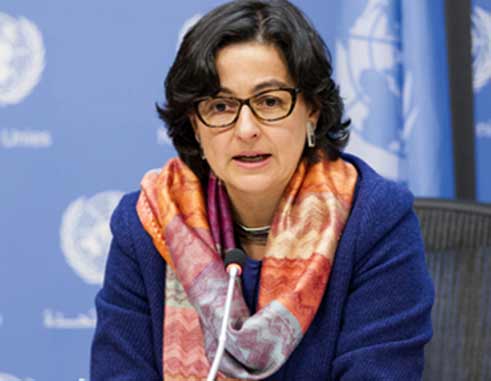By Arancha González Executive Director of the International Trade Centre, the joint agency of the World Trade Organization and the United Nations. Follow her on Twitter @Aranchaglezlaya
The Caribbean is known globally as a region of sea and sun with a highly educated and innovative workforce and which for many years has been a beacon for how small countries can integrate regionally. On the international trade, climate and development scene the region has been a leader in pushing the concept of “vulnerability” of small states and the need to take into account their specific characteristics.
As I visit the region for the first time in my role as Executive Director of the International Trade Centre (ITC), the trade development agency of the United Nations and the World Trade Organisation (WTO) I am well aware that beyond the sun, there is sometimes also rain. And although hurricane season may be over in the Caribbean, economic storms loom on the horizon.
The global economy looks shaky, making consumers and investors everywhere think twice before spending. Growth projections for the region have been scaled back. While the United States economy looks relatively robust, large swathes of Latin America are sliding into recession.
The commodity price collapse of the past 18 months has mixed implications for the Caribbean. Cheap oil should benefit tourism-heavy economies by lowering travel costs, but major oil and gas exporters will be buffeted by falling revenues. Geopolitical changes, too, lie in store. The rapprochement between Washington and Cuba promises to generate new opportunities for regional trade along an arc stretching from an expanded Panama Canal through Miami and Havana down to Barbados and Guyana. Yet it will also mean increased competition for members of the Caribbean Community. To weather the turbulence ahead – or at least minimise vulnerability to events outside their control – Caribbean countries must prepare.
Increasing productivity and competitiveness has to be a central goal of economic policy. Not because they are ends in themselves, but because they are indispensable for raising people’s living standards, wages, and life opportunities. Productivity gains in small and medium-sized enterprises (SMEs) are especially important, since, in the Caribbean as elsewhere, they account for the vast majority of jobs. More productive SMEs mean better jobs, in particular women and youth. Trade can help drive productivity growth and job creation – but only if a country’s companies are competitive enough to supply quality, value-added goods and services to value chains.
Cutting barriers to trade, investment, and labour flows across the Caribbean can help achieve economies of scale unachievable within individual small island states. This is precisely why Caricom governments are creating a regional single market. And even if barriers to trade in the region remain, the share of Caribbean non-oil exports to other countries in the region has ticked upwards to about 15%.
But freeing up trade isn’t just about deals with other countries. There is a lot that governments could do – at home – to make life easier for their own exporters. It’s easy to assume that obstacles to trade occur mainly in prospective markets, whether in the shape of high import duties or complex regulatory requirements and other ‘non-tariff’ barriers. But in reality, it turns out countries do plenty to shoot their own exporters in the foot. Getting official certificates of origin for exports can be unnecessarily expensive and time-consuming; customs processes are often onerous, making imported inputs costly and hurting local producers’ competitiveness. The Caribbean region is no exception to this trend. In surveys carried out by the International Trade Centre in Jamaica and Trinidad and Tobago, businesses reported that many of the regulatory hurdles they encountered occurred before their goods left the country. And once their goods managed to leave the port, roughly half the non-tariff problems they ran into were in other Caricom members.
Making trade-related rules and procedures simpler and more transparent, together with investing in the region’s laboratory and testing infrastructure for products to receive health and safety clearance, would increase trade across the Caribbean. It would also improve companies’ export prospects elsewhere in the Americas and further afield. The World Trade Organization’s agreement on trade facilitation is a useful tool for cutting trade costs, and the International Trade Centre is at work with several Caribbean governments to implement it. Because it is one thing to make trade possible. But it is even more important to make trade happen.
Central to this task is competitiveness-enhancing reforms to identify and remove bottlenecks inhibiting SMEs, whether inadequate access to finance or unreliable logistics. The services sector merits particular attention here. For Caribbean countries, services like business process outsourcing offer rich potential for growth and job creation. For an app developer in Jamaica, being on an island doesn’t matter: a good internet connection is what counts. Connectivity is critical for goods trade, too: eBay or Etsy and access to an international payment system like PayPal are enough for a clothing designer in Saint Lucia to become a ‘micro-multinational’ selling to people around the world.
Expanding trade promotion support, especially for new and dynamic SMEs, could help Caribbean companies make new inroads into foreign markets. A recent study conducted by ITC shows that the payoffs from export promotion are high, with each dollar spent resulting in up to US$87 in additional exports. At a more fundamental level, better education and innovation would lay the foundations for faster growth.
In sum, despite global economic uncertainty, there is much that Caribbean countries can do, at home and regionally, to capitalise on trade opportunities and drive growth and job creation. As I commence my first official visit to Barbados and Saint Lucia, I can assure Caribbean governments and SMEs alike that the International Trade Centre stands ready to be their partners in making trade work for all.















